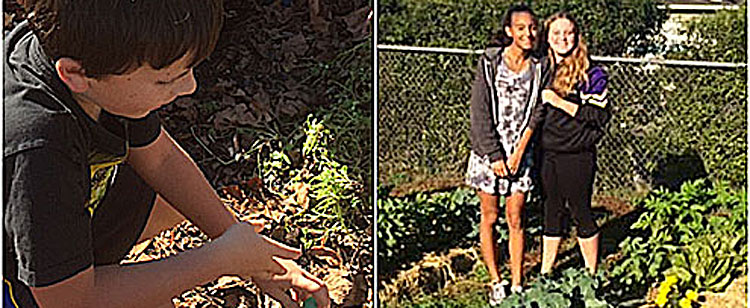By Scott Turnbull, Superintendent Soquel Union Elementary School District
“The love of gardening is a seed once sown that never dies.” — Gertrude Jekyll
(British horticulturist, artist, and writer)

Soquel Union Elementary School District embraces the use of school gardens as real world classrooms for our students. Learning in a school garden makes common sense and it aligns perfectly with many of the current state-adopted science standards (called Next Generation Science Standards). Below are just a few sample standards that lend themselves to learning in a garden setting:
- Grade 5: Support an argument that plants get the materials they need for growth chiefly from air and water.
- Middle School: Conduct a scientific explanation based on evidence for the role of photosynthesis in the cycling of matter and flow of energy into and out of organisms.
Recently, I went to visit some of our school gardens in action. I started at Santa Cruz Gardens Elementary School. Summer Carney was there teaching a lesson on composting. The children sat on straw bales while listening to directions and were just as focused as they would be inside a classroom. Students started off by recalling that composting is made up of “browns, greens, air, and water.” A new vocabulary word, anaerobic (without air), was introduced. Finally, students were sent off either to smash their composting bags or to collect leaves.
Summer and her husband are parents at the school and have been working to help maintain the school garden for approximately seven years now. Having her substitute credential gives her the flexibility to teach actual lessons during the day. Summer stated that her favorite part of teaching in the garden is “all of it” but if she had to narrow it down it would be knowing that “the kids will all know what compost is, what worms need to live, what broccoli plants look like, and what chayote tastes like.”
At Main Street Elementary School I had the good fortune to meet Bobbi Toshikian. Bobbi is a retired science teacher (most recently at Shoreline Middle School). She brings 37 years of teaching experience to her volunteer role at Main Street. She prepares lessons and organizes tools and currently has sugar peas, carrots, kale, broccoli, beets, and lettuce in bloom. Bobbi explained to me that the garden program at Main Street receives strong support from the school’s parent group, Friends of Main Street (FOMS).
The lesson in the Main Street garden on this day posed a question for students to investigate. “Which fruit contains the most Vitamin C?” The choices were strawberries, kiwi, red bell peppers, or oranges. Students used an iodine solution, a cup of water, and a Vitamin C Tablet as a control sample and then tested for the number of drops of each fruit’s juice. Before the final results were tabulated and discussed, students were asked to reflect back on their hypotheses. So, which fruit do you think had the most Vitamin C? It was the red bell pepper!
At New Brighton Middle School the school garden is maintained by the Healthy Living Class taught by Mr. Andrew Shapiro with lots of support from volunteers Christy McCain and Randa Solick (Randa is a former New Brighton Teacher). Students immerse themselves in all aspects of gardening from preparing the soil, adding compost, planting seeds, and harvesting the crops. The vegetables are then used in cooking projects to fully engage students. Mr. Shapiro indicated “students benefit in so many ways from these activities from becoming more relaxed as they dig in the soil to developing a taste for healthy, fresh foods that they have grown themselves.”
One other name kept coming up in all my school garden conversations. That name was Don Meyers. Mr. Meyers is the school district’s Grounds Specialist and it was mentioned multiple times how he goes above and beyond in his duties to contribute to making sure our students have well-maintained gardens. As one person told me, “Mr. Meyers provides soil, chips, and (gardening) tips!”
The poet Mary Sarton once said “everything that slows us down and forces patience, everything that sets us back into the slow circles of nature, is a help. Gardening is an instrument of grace.” In our district we are fortunate to have many folks who agree with Ms. Sarton and are willing to put in the effort to help our students reap the benefits of gardening.